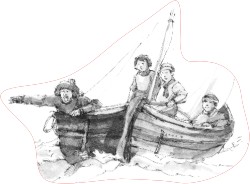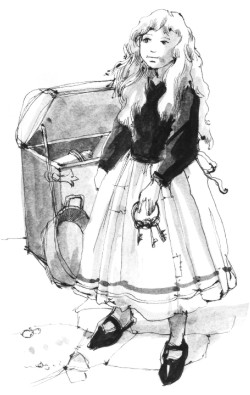Story
The Selkie Wife
Continued from Last Issue
 'I dinna intend to return yon selkie skin,' he said. 'Y'll nae be awa to sea again, ma bonnie lass. Y'll stay wi' me and be ma goodwife.' 'I dinna intend to return yon selkie skin,' he said. 'Y'll nae be awa to sea again, ma bonnie lass. Y'll stay wi' me and be ma goodwife.'
He put his plaid around the weeping maid and took her by the hand, leading her to his farm. Once there he wrapped her in a woollen blanket and gave her a supper of bannock cakes and hot brose porridge. While she was eating, he stole out to the barn, folded up her selkie skin and hid it on a beam beneath the roof, where she would never find it.
Poor maid. After her supper she lay down upon a bed and wept the whole night through. Likewise the next day too. And through the week.
But there came a time when her tears dried up and there was nothing for it but to make the best of her new mortal life. Her goodman was fairly kind to her, if a mite unpolished in his ways. He provided enough to eat and taught her all a farmer' wife should know. Though she did not love him, nor altogether accept her homely life, she did not suffer hunger, cold or beatings.
As the years went by, she bore him half a dozen children: three boys and three girls, all as handsome as can be, with large gentle brown eyes and smooth white skin, akin their mother, and strong-boned limbs and sturdy bodies, akin their father.
Although she was fond of her children and never more spoke about her life as a seal, the selkie wife cast many a sad, yearning glance towards the sea. On an evening, when the day's work was done, she would sit upon the sandy shore, gazing sadly out to sea, as if searching for someone amid the waves. At such moments, she would sing haunting, mournful, oddly-beautiful songs that touched the heart and blurred the eye of all who chanced to catch their music on the wind.
Now it happened one time, in an evening in late spring, when the farmer had taken the three sons fishing in their boat, and the two eldest girls had gone to gather cockles in the wet sand laid bare by the ebbing tide, that the selkie wife and her youngest daughter were sitting at home.
No sooner had her husband and the other children left the house than the selkie wife was in and out of all the cupboards, feeling all along the lofty shelves, peering under beds and tables, rummaging in all the chests and boxes, sighing all the while.
 'Whist, Mam,' her little daughter said, 'what is it that ye're seeking?' 'Whist, Mam,' her little daughter said, 'what is it that ye're seeking?'
'Och, ma peerie bairn,' the seal wife said, 'I'm looking for a bonnie selkie skin your father once brought hame.'
'Wad it be soft and silvery wi bonnie bruin spots?' the daughter asked.
'Aye, ma bonnie bairn, that it wad! D'ye ken where t'is?' the selkie wife cried excitedly.
'That I do,' the daugter said. 'One evening as ye were down singing on the sands and I was in the old stane barn playing, I saw father come in and take doon such a bonnie skin from a wooden beam. He didna ken that I was there. How he sighed as he stroked that skin and held it to his cheek. Then he stood on tiptoe and put it back upon the roof beam.'
The girl had hardly finished speaking when her mother rushed from the house towards the old stone barn. In an instant she was inside the barn, standing on a box, feeling with trembling hands along the beams. She felt all the way along one rough wooden beams, and then another and another. At last, as her dusty, excited fingers edged along a beam they touched something soft - her selkie skin! Pulling it down, she clasped it lovingly to her breast and ran back with it to the house.
'Fare ye well, ma bonnie bairn,' she said to her little daughter. 'I must awa to ma ain hame.'
She ran across the heather to the cliff, clutching the seal skin close like some very precious thing. Down the cliff path she hurried to the sea, pulled on her long-lost skin and, with a last wave to her two daughters on the shore, she dived into the water and swam away.
When she was already far out to the sea, she saw the fishing boat with her husband and three sons. For several moments she swam alongside it as if trying to tell the fishermen something. They were puzzled by the friendly seal that swam so close, its head lifted above the waves, looking at them with its lovely gentle eyes shinning with a gleam that mingled joy with sadness. All of a sudden with a painful cry of recognition, Jock Guthrie snatched up his net and went to cast it in the water.
But it was too late. The seal had dived under the waves and was soon far, far away, swimming out to sea. That was the last Jock Guthrie ever saw of his beloved selkie wife.
In the months and years that followed, Jock would often wander of an evening, when his day's work was done, upon sandy shore. Or he would sit upon a rock gazing hopefully out to sea. But never again did he catch a glimpse of his bonnie wee selkie. She had gone where no mortal man could ever follow.
If you found the dialogues in this story a little strange and difficult to understand, it is probably because it is in Scottish English. Scottish English refers to the varieties of English spoken in Scotland. The main, formal variety is called Scottish Standard English or Standard Scottish English. Scottish English has some distinctive vocabulary. Scottish English is the result of language contact between Scots and the Standard English of England after the 17th century.
Source: Wikipedia.com
|
